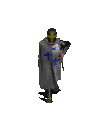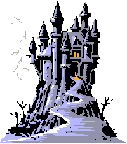 Algorithms
Algorithms 
On the Grail Quest, Bors and Percival (both holy knights accompanying the best knight, Galahad) face many tests and temptations. Demons, evil priests, holy hermits, and ancient saints all place tests, offer visions, and provide spiritual complications to these knights.
I want to focus on two particular temptations, one of Percival and one of Bors.
Percival is tempted by a disinherited noblewoman, who pleads with him to help her defeat her former “master” who kicked her from her court when she began to esteem herself too highly. She tells him that he is her only hope to gain back her rightful lands. She says she specifically chose him because of his new and youthful strength. She lays out a pavilion for them to sleep together in, as is typical of worldly lovers.This temptation has everything that would appeal to a young knight: she is vulnerable, dependent, but able to establish him powerfully. She lays out for him tropes that directly correspond with his desires. He cannot see that these tropes also outline her true identity: Lucifer, disinherited from his place in the court of Heaven, rebelling against God. Percival, in the demon’s bedchamber, is only saved by glancing at the pommel of his sword, where he sees the cross. He crosses himself in response, and the woman and all her attendants turn to shrieking demons and flee. The tent turns upside down, and Percival repents of his intention to do evil.


Bors is tempted similarly by a devil disguised as a woman. She, however, knows Bors is a more experienced knight, but one more battle-worn. He has regrets, has seen his family hurt by his actions, and has deep guilt for some of his past wrongdoing. Thus she appears to him as a woman who has long, long loved him, and finally has found him. She feeds him food and drink to forget his troubles. When that is not enough to tempt him to her bed, she and her attendants threaten to throw themselves off of a tower in sorrow if he doesn’t sleep with her. Bors still, with much sorrow, refuses. They throw themselves from the tower, disappearing before they hit the ground.

Both instances of temptation involve the demons aping tropes of chivalric romance, but tailored specifically to the weaknesses and desires of the knights. Both knights are not saved by particular steadfast will against demons, but rather by rules, symbols, and oaths they have surrounded themselves with.
We live in tech-landscapes full of similar creatures: tempters who build themselves entirely to ape what tropes will please us: Algorithmically generated succ/incubi built to look exactly like what we would seem to want, given our demographic, socio, cultural background. We cannot hope to simply resist them ourselves, with our own willpower. After all, they are built in imitation of what motivates our wills. We must surround ourselves with symbols, structures, rules, and oaths to dispel these evils.
